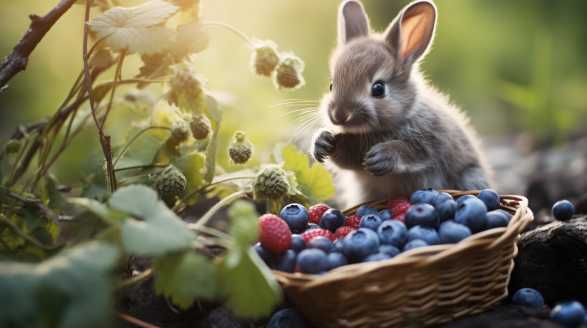Introduction
Can Rabbits eat blueberries? Let’s find out.
It turns out that blueberries, those tiny balls of deliciousness, can be the secret ingredient to take your rabbit’s health and happiness to a whole new level. I know, I know – it sounds almost too good to be true!
And that’s exactly what blueberries do!
Blueberries are bursting with antioxidants, fiber, and essential vitamins that can boost your rabbit’s immune system, aid in digestion, and promote overall well-being. Can you believe it?
But, my dear fellow rabbit enthusiasts. Before you dash out to the store and stock up on blueberries for your furry friend, there are a few things you need to know.
We need to introduce blueberries gradually, taking into account our rabbit’s unique dietary needs and monitoring their response. But don’t worry – I’ll guide you through it all, step by step, ensuring a safe and delicious journey for your beloved bunny.
So, are you ready to unlock the wonderful world of blueberries for your furry friend? Get ready to spoil them with a treat that not only makes their taste buds dance but also supports their health in the most delightful way.
Let’s dive in, my fellow bunny enthusiasts, and discover the magical benefits of blueberries together!
**Do Not Give Any Food To A Rabbit Without Consulting A Veterinarian
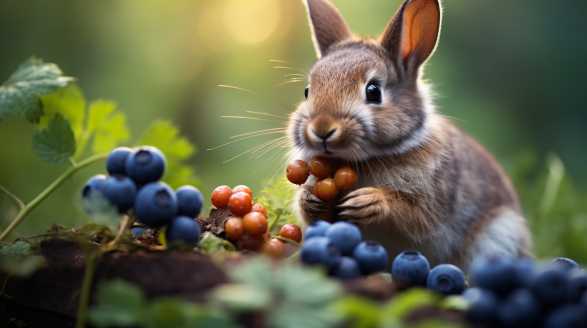
Key Takeaways
- Blueberries are safe and nutritious for rabbits in moderation.
- Consult your vet before introducing blueberries to your rabbit’s diet.
- Start with small quantities and observe your rabbit’s response.
- Gradually increase the quantity if there are no negative effects.
- Always wash blueberries thoroughly before feeding them to your rabbit.
- Fresh is best – opt for organic blueberries whenever possible.
- Focus on variety and don’t rely solely on blueberries for your rabbit’s diet.
- Monitor for allergies or digestive issues and discontinue feeding if necessary.
- If blueberries don’t work for your rabbit, there are other rabbit-friendly fruits to try.
- Blueberries are rich in antioxidants, vitamins, and fiber which can boost immune system and aid digestion in rabbits.
- Blueberries should be introduced gradually and in moderation.
- Blueberries can be included as a supplemental food for pregnant or nursing rabbits.
- Blueberries can contribute to weight management in rabbits if offered in moderation.
- Blueberries can help improve fur and skin health in rabbits.
- Blueberries can help promote healthy teeth in rabbits by stimulating dental health, acting as a natural teeth cleanser, fighting oral bacteria, and reducing oral inflammation.
Are Blueberries Safe for Rabbits? Everything You Need to Know
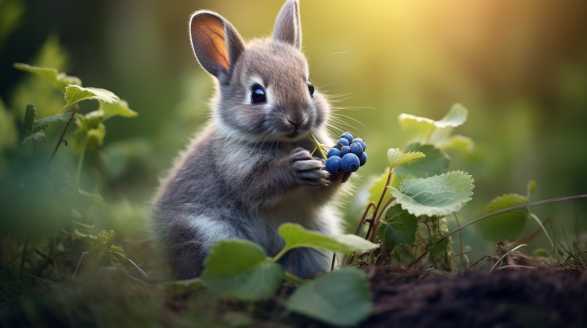
Hey there, fellow rabbit enthusiasts! If you’re anything like me, you probably find yourself wondering about what treats are safe and healthy for your furry little friends.
So, sit back, grab a carrot, and let’s get started!
The Blueberry Bonanza
Blueberries are the epitome of deliciousness. Bursting with juicy goodness, these small berries are often hailed as a superfood for humans due to their numerous health benefits.
Can Rabbits Really Eat Blueberries?
The answer to this burning question is a resounding yes! In moderation, blueberries can be a delightful and healthy treat for your precious bunnies.
- Vitamins Galore: Blueberries are jam-packed with essential vitamins, including Vitamin K, Vitamin C, and Vitamin E. These vitamins promote overall health and boost your rabbit’s immune system.
- Powerful Antioxidants: Blueberries are teeming with antioxidants, which help fight free radicals and protect your rabbit’s cells from damage.
- Goodbye, Constipation: Blueberries have high water content and are an excellent natural source of fiber. This can help prevent constipation and maintain a healthy digestive system for your furry friend.
- Hydration Heaven: As mentioned, blueberries are water-rich. Offering your rabbits a few blueberries can provide them with a tasty way to stay hydrated.
Moderation is Key
While blueberries are indeed safe and beneficial for your rabbits, it’s crucial to remember the golden rule of moderation. As rabbit owners, we must strike a balance between treats and their regular diet.
- Serving Size: Limit blueberries to an occasional small treat, typically one or two berries, depending on the size of your bunny. Remember, too much of a good thing can lead to digestive issues.
- Fresh and Organic: Always opt for fresh, organic blueberries to ensure your rabbits aren’t exposed to harmful pesticides or preservatives.
- Wash Thoroughly: Before feeding blueberries to your rabbits, remember to wash them thoroughly under running water. This removes any potential residues and ensures your bunnies stay safe.
Potential Risks and Considerations
While blueberries are generally safe for rabbits, it’s important to consider a few risks and understand the unique needs of your furry companions. Here are a few things to keep in mind:
- Sugar Content: Blueberries do contain natural sugars. While this is not a significant concern, rabbits with weight issues or diabetes should consume blueberries in moderation or avoid them altogether.
- Allergies: Just like humans, rabbits can have allergies too. It’s essential to observe your rabbits after introducing blueberries for the first time. If you notice any adverse reactions, such as itching, diarrhea, or respiratory problems, it’s best to discontinue feeding them blueberries.
- Digestive Sensitivity: Every bunny is different, and some may have more sensitive tummies than others. Pay attention to your rabbit’s digestion patterns and discontinue feeding blueberries if you notice any adverse effects like loose stools or upset stomachs.
The Love for Variety
While blueberries can make for a tantalizing treat, it’s always a good idea to introduce a variety of safe fruits and vegetables to your rabbit’s diet. This ensures they receive a well-rounded assortment of nutrients and prevents boredom.
- Apples (without seeds)
- Bananas (in moderation)
- Strawberries
- Carrots
- Broccoli (in moderation)
- Bell peppers
- Cucumbers
Remember, always introduce new foods gradually and in small portions, giving your rabbit’s sensitive digestive system time to adjust.
So there you have it, dear rabbit lovers! Blueberries can indeed be a safe and nutritious treat to offer your adorable furry buddies, as long as they are enjoyed in moderation.
Just be mindful of any allergies, digestive sensitivities, and the sugar content when including blueberries in their diet.
Now, armed with this new knowledge, go forth and spoil your precious bunnies with a blueberry bonanza! But always remember, a healthy and balanced diet is the key to a hopping good time for your beloved companions.
How to Properly Introduce Blueberries into a Rabbit’s Diet
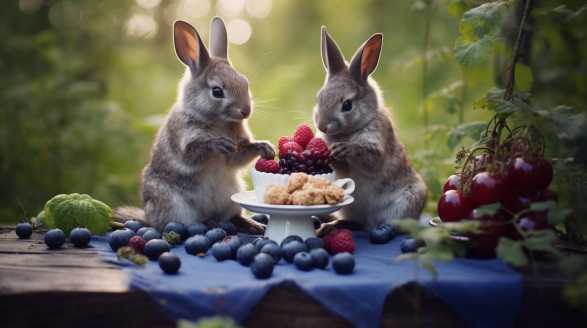
Hello there, fellow rabbit enthusiasts! If you are anything like me, you love spoiling your furry little friend with delicious treats.
Blueberries are not only a tasty snack but also packed with nutrients that can benefit your bunny’s health. However, it’s important to follow a proper introduction process to ensure your rabbit can safely enjoy this delightful fruit.
Why Blueberries for Rabbits are a Great Idea
Blueberries are not just a delightful treat; they are also incredibly nutritious for rabbits. Rich in antioxidants, fiber, and vitamins C and K, these tiny fruits can provide numerous health benefits to your furry companion.
Now, let’s jump right into the exciting process of safely introducing blueberries into your rabbit’s diet!
1. Consult Your Vet
Before making any changes to your rabbit’s diet, it is always wise to seek advice from a qualified veterinarian. They will assess your rabbit’s health and offer specific guidance tailored to their unique needs.
2. Start with Small Quantities
As with any new food, it is essential to begin with small amounts. Rabbits have sensitive digestive systems, so we want to avoid overwhelming them.
Monitor their digestion and overall well-being for any adverse reactions.
3. Observe Your Rabbit’s Response
As mentioned earlier, it’s crucial to closely monitor your rabbit’s reaction to blueberries. Some bunnies may absolutely adore blueberries, while others might not appreciate the taste or experience digestive issues.
4. Gradually Increase the Quantity
Assuming your bunny is enjoying blueberries without any negative effects, you can gradually increase the quantity you offer. As a general guideline, one or two blueberries per serving, two to three times a week, is usually sufficient.
5. Always Wash Blueberries Thoroughly
Before feeding blueberries to your rabbit, it is important to wash them thoroughly. This helps remove any potential pesticides or dirt that may be present on the fruit’s surface.
6. Fresh is Always Best
When it comes to offering blueberries to your rabbit, fresh is always the way to go. Opt for organic blueberries whenever possible and avoid those that are excessively soft or moldy.
7. Focus on Variety
While blueberries are a fantastic treat, it’s important not to rely solely on them. Keep in mind that rabbits require a balanced diet consisting of hay, fresh vegetables, and occasional treats.
8. Monitor for Allergies or Digestive Issues
Despite their nutritional benefits, blueberries may not agree with every rabbit. Some bunnies may experience allergies or digestive discomfort when consuming this fruit.
9. Blueberry Alternatives
If, for any reason, blueberries do not work well for your rabbit, fear not! There are plenty of other bunny-friendly fruits you can try, such as strawberries, raspberries, or slices of apple.
Final Words
Introducing blueberries into your rabbit’s diet can be an exciting and rewarding experience. Remember to consult your vet, start small, and observe your rabbit’s response.
So go ahead, spoil your furry friend with the occasional blueberry and watch their happy little face light up with joy!
Happy blueberry-introducing adventures!
The Benefits of Blueberries for Rabbits: A Nutritional Guide
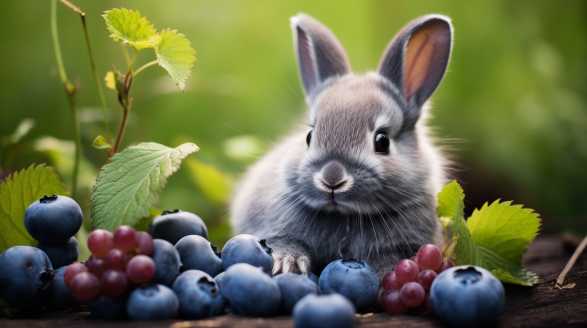
As a proud rabbit owner, I am always on the lookout for ways to keep my furry friend happy and healthy. Recently, I stumbled upon a fascinating fact: blueberries are not only a delicious treat for humans but also a fantastic addition to a rabbit’s diet.
I will share with you everything I have learned about the nutritional advantages of blueberries for our adorable hoppy companions.
Blueberries: A Nutritional Powerhouse for Rabbits
Blueberries, those tiny bursts of blue delight, are packed with essential nutrients that can contribute to your rabbit’s overall well-being. Here are some key reasons why blueberries should be included in your rabbit’s diet:
- Rich in Vitamins and Minerals: Blueberries are a fantastic source of vitamins C and K. These vitamins help support your rabbit’s immune system and promote healthy bones and blood clotting.
- Antioxidant Power: Blueberries are renowned for their high antioxidant content. These antioxidants help combat free radicals, reducing the risk of chronic diseases and promoting a longer, healthier life for your bunny.
- Fiber Content: Fiber is crucial for maintaining a healthy digestive system in rabbits. Blueberries contain both soluble and insoluble fiber, enhancing gut movement and preventing digestive issues.
- Hydration: Did you know that blueberries contain about 85% water? Including these juicy berries in your rabbit’s diet can contribute to their overall hydration, keeping them refreshed and healthy.
How to Introduce Blueberries to Your Rabbit
Now that you understand the incredible nutritional benefits of blueberries for rabbits, you might be wondering how to incorporate this superfood into your furry friend’s diet. Here’s a step-by-step guide:
- Start Slow: As with any new addition to your rabbit’s diet, it’s essential to introduce blueberries gradually. Begin by offering a small portion and observe your rabbit’s reaction and digestion.
- Fresh and Organic: Opt for fresh, organic blueberries to ensure that your rabbit receives all the natural goodness without any harmful pesticides or additives.
- Preparation Tips: Wash the blueberries thoroughly before feeding them to your rabbit. Remove any stems or leaves, as they can be potential choking hazards.
- Moderation is Key: While blueberries have numerous benefits, moderation is vital. Too many blueberries can disrupt your rabbit’s digestive system or lead to obesity. Treat blueberries as an occasional snack rather than a daily staple.
Other Rabbit-Friendly Fruits and Vegetables
Blueberries are undoubtedly a fantastic addition to a rabbit’s diet, but they should not be the sole focus. To provide a well-rounded and varied diet for your rabbit, consider adding the following fruits and vegetables:
Fruits:
- Strawberries
- Apples
- Pineapple
- Mangoes
Vegetables:
- Carrots
- Leafy Greens (such as kale and spinach)
- Bell peppers
- Broccoli
The Dos and Don’ts of Feeding Blueberries to Rabbits
While blueberries are generally safe and beneficial for rabbits, there are a few important dos and don’ts to keep in mind:
Dos:
- Offer fresh, organic blueberries to your rabbits.
- Introduce blueberries gradually, observing your rabbit’s reactions and digestion.
- Remove stems or leaves before feeding the blueberries to prevent choking hazards.
- Consider blueberries as an occasional treat rather than a daily staple.
Don’ts:
- Overfeed blueberries, as it can lead to digestive issues or obesity.
- Only feed blueberries and neglect other essential fruits and vegetables in your rabbit’s diet.
- Give frozen blueberries to your rabbit, as they can be too cold and potentially harmful.
Blueberries are indeed a nutritional powerhouse for rabbits. Packed with vitamins, minerals, antioxidants, and fiber, these delightful berries can contribute to your rabbit’s overall health and well-being.
So, why not treat your bunny to a few blueberries today and witness the joy and enrichment it brings to their colorful world?
The Best Blueberry Treats for Your Rabbit: Homemade Recipes
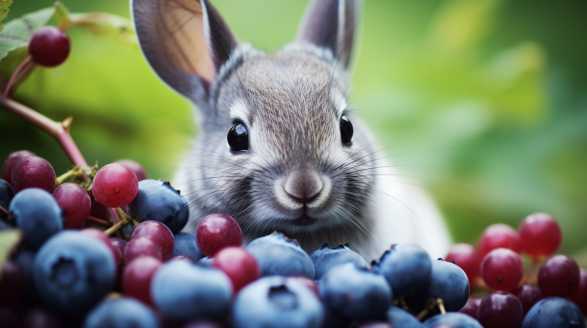
Hello fellow rabbit lovers! Are you looking for a delicious and healthy treat to spoil your furry friend?
Blueberries are not only packed with antioxidants, but they’re also safe and beneficial for rabbits in moderation. So grab your apron, and let’s get cooking!
Why Blueberries are Great for Rabbits
Before we look into the delightful recipes, let’s take a moment to understand why blueberries are a fantastic choice for your rabbit’s treat. Just like us, rabbits can benefit from the nutritional value of blueberries.
However, it’s crucial to remember that moderation is key and should be incorporated into a balanced diet.
The Berry Basics: General Guidelines
Before we begin our blueberry adventure, let’s go through a few general guidelines to ensure your rabbit’s safety and enjoyment:
- Always consult with your veterinarian before introducing new treats into your rabbit’s diet.
- Blueberries should be offered as an occasional treat and not replace a regular diet of hay, fresh greens, and pellets.
- Introduce blueberries gradually to avoid any digestive upsets.
- Remove any uneaten blueberries after a couple of hours to prevent spoilage or contamination.
Now that we have our fluffy friend’s well-being in mind, let’s jump straight into the mouth-watering recipes!
Recipe 1: Simple Blueberry Delight
Ingredients:
- 1/4 cup fresh blueberries
- 1 tablespoon rolled oats
- 1 tablespoon plain unsweetened yogurt
Instructions:
- Wash the blueberries thoroughly and set them aside.
- In a small bowl, mix the rolled oats and plain yogurt until well combined.
- Gently fold in the blueberries, ensuring they are evenly distributed.
- Serve this tasty mixture to your rabbit as a refreshing snack.
Recipe 2: Frozen Blueberry Bliss
Ingredients:
- 1/2 cup fresh blueberries
- 1 small ripe banana
- 1/4 cup water
Instructions:
- Place the blueberries and the banana in a blender.
- Slowly add water while blending, until you achieve a smooth consistency.
- Pour the mixture into ice cube trays or silicone molds.
- Freeze for a few hours until solid.
- Remove the frozen treats from the tray/mold and offer them to your rabbit to nibble on during hot summer days.
Recipe 3: Blueberry Bunny Muffins
Ingredients:
- 1 cup whole wheat flour
- 1 teaspoon baking powder
- 1/2 cup fresh blueberries
- 1/4 cup mashed banana
- 1/4 cup unsweetened applesauce
- 1/4 cup water
Instructions:
- Preheat your oven to 350°F (175°C) and line a mini-muffin tray with paper liners.
- In a bowl, whisk together the whole wheat flour and baking powder.
- In a separate bowl, mix the mashed banana, unsweetened applesauce, and water.
- Slowly add the dry ingredients to the wet mixture, stirring until just combined.
- Gently fold in the blueberries.
- Spoon the batter into the prepared muffin tray, filling each cup about two-thirds full.
- Bake for approximately 15-20 minutes or until a toothpick comes out clean.
- Allow the muffins to cool completely before offering them to your bunny.
Recipe 4: Blueberry Hay Stack
Ingredients:
- Fresh blueberries
- Timothy or meadow hay
Instructions:
- Fill a small bowl or plate with a handful of fresh blueberries.
- Grab a bunch of timothy or meadow hay and weave the ends into a small “hay stack” shape.
- Place the hay stack in the bowl/plate filled with blueberries.
- Watch your delighted rabbit nibble and forage through the hay to find the delicious blueberries hidden inside.
Congratulations! You are now armed with an array of scrumptious and healthy blueberry treats for your rabbit.
These homemade recipes are not only full of flavor but also provide your fluffy companion with added nutrients and mental stimulation. So go ahead, treat your beloved bunny to the best blueberry delights and watch those adorable whiskers twitch with joy!
The Nutritional Value of Blueberries
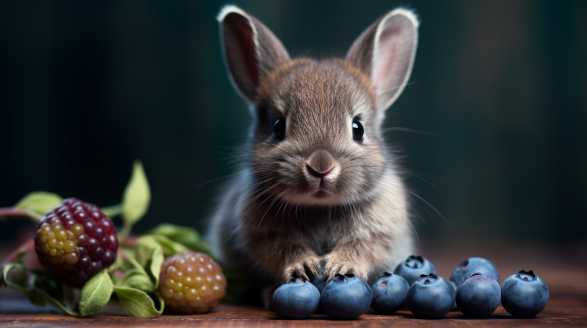
Blueberries are often hailed as a superfood for humans due to their high levels of antioxidants, vitamins, and fiber. But what about rabbits?
Antioxidants
Blueberries are packed with antioxidants, which help fight off harmful free radicals in the body. These antioxidants can also help boost the immune system, protecting rabbits from various health issues.
Vitamins
Blueberries are an excellent source of vitamins, including vitamin C, vitamin K, and vitamin E. Vitamin C, in particular, is crucial for rabbits as they cannot produce it naturally. This vitamin aids in the growth and repair of tissues, enhances the absorption of iron, and helps maintain a healthy coat.
Fiber
Rabbits need a high-fiber diet to support their digestive system. Luckily, blueberries are rich in dietary fiber, which aids in digestion and prevents gastrointestinal issues such as bloating and diarrhea.
Weight Management in Rabbits
Just like humans, rabbits can also struggle with weight management. Obesity in rabbits can lead to various health problems, including difficulty breathing, arthritis, and reduced lifespan.
The answer is a resounding yes!
Low in Calories
Blueberries are relatively low in calories, making them a great option for adding to your rabbit’s diet. By incorporating blueberries into their meals, you can provide a nutrient-dense and filling treat without overloading them with unnecessary calories.
Satiety
Blueberries are also high in fiber, which promotes satiety. By including blueberries in your rabbit’s meals or using them as a snack, they will feel more satisfied, reducing the chances of overeating and aiding in weight management.
Less Unhealthy Snacking
By offering blueberries as a healthy alternative to other high-calorie snacks, you can help your rabbit maintain a healthy weight. Many commercially available rabbit treats are packed with sugars and unhealthy ingredients that can contribute to weight gain.
Incorporating Blueberries into Your Rabbit’s Diet
Now that we know the benefits of blueberries for weight management in rabbits, let’s explore some creative ways to include this fruit in their diet.
1. Blueberry Salad
Mix a handful of fresh, washed blueberries with your rabbit’s regular greens. They will love the burst of sweetness in their salad, and you can rest assured knowing you’re providing them with essential nutrients.
2. Frozen Blueberry Treats
Freeze a few blueberries and offer them to your rabbit on hot summer days. It will not only help cool them down but also provide them with a refreshing and healthy treat.
3. Blueberry Stuffed Toys
If you have a rabbit that loves tossing around toys, consider stuffing a small toy with a few blueberries. This creates mental stimulation and adds a fun element to their playtime.
4. Blueberry Smoothies
Blend a handful of blueberries with water or rabbit-safe juice and offer it to your bunny as a tasty smoothie. This can be a great way to introduce blueberries to picky eaters who may not be keen on eating them whole.
5. Blueberry Mash
Mash a few blueberries and mix them with your rabbit’s regular pellet food. This not only adds a burst of flavor but also encourages them to eat their pellets, ensuring they receive all the necessary nutrients.
Don’t Overdo It!
While blueberries can play a role in weight management for rabbits, it’s important not to overdo it. Moderation is key, as too many blueberries can cause digestive upset in some rabbits.
Blueberries can indeed help with weight management in rabbits. Their low-calorie content, high fiber content, and various health benefits make them a fantastic addition to your rabbit’s diet.
So, why not treat your furry friend to some blueberries today? Not only will you be providing them with a tasty and nutritious snack, but you’ll also be taking a step towards ensuring their overall well-being and weight management.
Including Blueberries in a Rabbit’s Diet: Dos and Don’ts
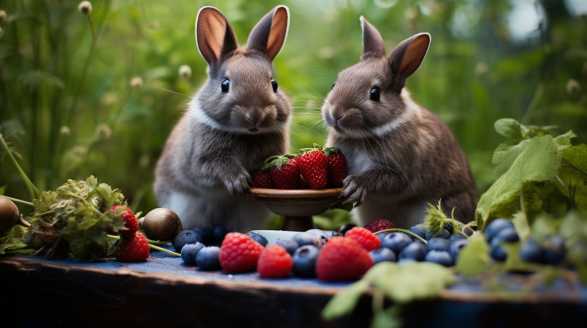
As a proud bunny owner, I’m always seeking out new and healthy ways to nourish my furry friend. One delightful addition to a rabbit’s diet is blueberries!
However, it’s crucial to exercise caution and follow some dos and don’ts when it comes to including blueberries in a rabbit’s diet. Let’s dive in and explore the dos and don’ts of feeding blueberries to our beloved rabbits!
The Dos of Feeding Blueberries to Rabbits
- Introduce small quantities: When offering blueberries for the first time, start with a small amount. It’s essential to observe your rabbit’s reaction and ensure they tolerate it well before increasing the quantity gradually.
- Opt for fresh blueberries: Always choose fresh and ripe blueberries, as they contain an abundance of nutrients. Avoid using frozen or rotten berries, as they may cause digestive disturbances.
- Wash the blueberries: Rinse the blueberries thoroughly with water before serving them to your rabbit. This step removes any harmful pesticides or bacteria that may be present.
- Serve as a treat: Treat blueberries as an occasional delicacy or reward, rather than a staple in your rabbit’s diet. Overconsumption may lead to weight gain and other health issues.
- Supplement a balanced diet: Blueberries should be considered as part of a well-rounded diet for your bunny. Ensure they have access to fresh hay, high-quality rabbit pellets, and daily servings of vegetables.
- Monitor for allergies: Pay close attention to your rabbit’s reaction after feeding them blueberries. Signs of an allergic reaction may include itching, sneezing, or digestive upset. Discontinue feeding if such reactions occur.
- Cut blueberries into small pieces: To avoid choking hazards, slice the blueberries into smaller, bite-sized pieces before serving them to your rabbit.
The Don’ts of Feeding Blueberries to Rabbits
- Avoid overfeeding: While blueberries are generally safe for rabbits, moderation is key. Overfeeding can disrupt their natural digestive process and may lead to diarrhea or other digestive issues.
- Stay away from sugar-coated blueberries: As tempting as they may be, sugary blueberries or those coated in sweeteners are a big no-no for rabbits. The added sugar can wreak havoc on their delicate digestive system.
- Never feed moldy blueberries: Always discard blueberries that have developed mold. Moldy berries can be toxic for rabbits and lead to severe health complications.
- Limit blueberry treats for rabbits with health issues: If your rabbit suffers from obesity, diabetes, or dental problems, it’s best to consult your veterinarian before introducing blueberries into their diet. These conditions may require special dietary considerations.
Health Benefits of Blueberries for Rabbits
Including blueberries in your rabbit’s diet provides several health benefits due to their rich nutritional profile. Here are some noteworthy advantages:
- Vitamin C boost: Blueberries are packed with vitamin C, which is essential for a rabbit’s overall health and immune system.
- Antioxidant properties: The antioxidants found in blueberries help combat harmful free radicals in your rabbit’s body, reducing the likelihood of cell damage and disease.
- Fiber content: Blueberries offer a good amount of dietary fiber, aiding in digestion and maintaining a healthy gut.
- Hydration: Blueberries have a high water content, contributing to your rabbit’s hydration levels. This is particularly beneficial during hot weather or if your bunny struggles with drinking enough water.
- Natural snack option: Blueberries serve as a tasty alternative to processed rabbit treats, allowing you to provide a more natural option for rewarding your furry friend.
Incorporating blueberries into your rabbit’s dietary routine can be a wonderful way to add flavor and nutrition to their meals. By following the dos and don’ts mentioned above, you can ensure the well-being and happiness of your beloved bunny.
Remember, variety is crucial when it comes to your rabbit’s diet, so feel free to explore other safe fruits and vegetables that can complement their nutritional needs. Happy feeding and enjoy the adorable reactions as your bunny munches on these delightful blue gems!
The Effects of Blueberries on Rabbit’s Fur and Skin Health
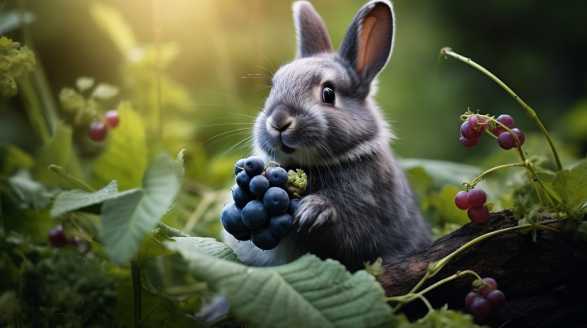
As a rabbit enthusiast and owner, I am constantly on the lookout for ways to improve the health and appearance of my furry little friends. Recently, I discovered a fascinating aspect of rabbit care that I couldn’t wait to share with you all!
Yes, you read that right! Let’s look into the incredible effects of blueberries on our rabbit companions.
How Blueberries Benefit Rabbit’s Fur and Skin Health
Blueberries are widely recognized as a superfood for humans due to their high content of antioxidants and beneficial vitamins. Thankfully, these benefits extend to rabbits as well!
Here are some incredible benefits:
- Improved Fur Texture: Blueberries contain essential vitamins like Vitamin C, Vitamin E, and other antioxidants that promote hair growth and improve the overall texture of a rabbit’s fur. Adding blueberries to their diet can leave their fur feeling softer, shinier, and healthier.
- Reduced Fur Loss: If your rabbit is experiencing excessive fur loss or shedding, blueberries can work wonders. The nutrients in blueberries help strengthen the hair follicles, reducing hair loss and leaving your rabbit’s coat thicker and more voluminous.
- Enhanced Skin Health: Blueberries have anti-inflammatory properties that can soothe irritated or inflamed skin conditions in rabbits. Regular consumption of blueberries may help alleviate skin issues like dryness, redness, or itching, allowing your rabbit to maintain healthy and comfortable skin.
- Vibrant Coat Color: Blueberries contain natural pigments known as anthocyanins, which can enhance the color intensity of a rabbit’s coat. Feeding your rabbit blueberries can result in a more vibrant, eye-catching coat color that is sure to turn heads!
How to Incorporate Blueberries into Your Rabbit’s Diet
Now that we understand the beneficial effects blueberries can have on our rabbits’ fur and skin health, let’s explore some practical ways to incorporate this superfood into their diet. Here are a few ideas:
- Fresh Blueberries: The simplest way to introduce blueberries to your rabbit’s diet is by offering them fresh. Wash a handful of blueberries thoroughly, remove any stems, and serve them as a treat. Make sure to start with a small amount and observe your rabbit’s reaction. Some rabbits may have a more sensitive digestive system, so it’s important to introduce new foods gradually.
- Frozen Blueberries: Frozen blueberries can be a refreshing and tasty summer treat for your rabbit. Simply freeze a few blueberries and offer them to your furry friend on a hot day. Not only will they appreciate the cooling effect, but their fur and skin will reap the benefits.
- Blueberry-Infused Hay: Another way to incorporate blueberries into your rabbit’s diet is by infusing their hay with the fruit’s flavor. Sprinkle a few mashed blueberries over their hay and give it a gentle mix. This will add variety to their diet while providing the fur and skin benefits they need.
- Blueberry Homemade Snacks: Get creative in the kitchen and whip up some homemade blueberry treats for your rabbit. There are plenty of simple recipes available online that cater specifically to rabbit dietary needs. Not only will your rabbit enjoy the tasty snack, but their fur and skin health will thank you!
Precautions When Feeding Your Rabbit Blueberries
While blueberries can be a fantastic addition to your rabbit’s diet, it’s essential to keep a few precautions in mind:
- Moderation is Key: Like with any treat, moderation is crucial. Blueberries should be offered as an occasional treat and not as a staple food source. Too many blueberries can upset your rabbit’s delicate digestive system, leading to gastrointestinal issues.
- Organic is Best: Whenever possible, opt for organic blueberries to ensure they are free from pesticides or harmful chemicals. It’s always better to prioritize your rabbit’s health by choosing the highest quality produce.
- Introduce Gradually: If your rabbit has never had blueberries before or if they have a sensitive stomach, introduce the fruit gradually. Start by offering a small amount and monitor their reaction before increasing the quantity.
Now that you know the incredible effects blueberries can have on your rabbit’s fur and skin health, it’s time to embark on this delicious and beneficial journey. Treat your bunny to this superfood and watch as their fur becomes softer, their skin healthier, and their overall well-being shines!
Stay attentive to your furry friend’s preferences and health, and enjoy the exciting transformation that blueberries can bring to their beloved fur coat.
The Role of Blueberries in Promoting Healthy Teeth for Rabbits
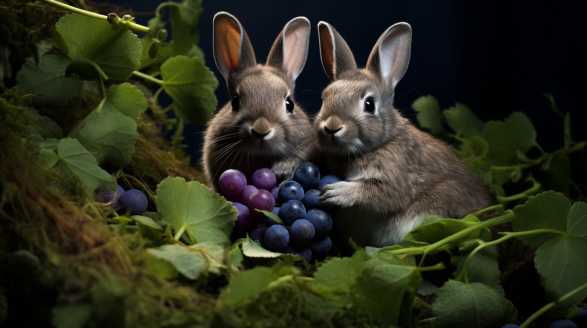
Have you ever wondered how to keep your beloved bunny’s teeth strong and healthy? Well, let me introduce you to the secret superfood for rabbit dental health – blueberries!
I’ll uncover all the fascinating ways blueberries benefit bunny’s dental hygiene. So, grab a handful of blueberries and let’s dig in!
Why Are Rabbit Teeth So Important?
Before we dive into the marvelous benefits of blueberries, let’s talk a little about why your bunny’s teeth are so crucial. Rabbits have unique dental needs compared to other furry friends.
Therefore, keeping those chompers in tip-top shape is vital for your rabbit’s overall health and happiness.
Blueberries to the Rescue!
Bursting with Essential Nutrients
Blueberries are like nature’s mouthwash for your bunny! These vibrant little berries are packed with essential nutrients that provide a range of benefits to your rabbit’s oral health.
Stimulating Dental Health
One of the most exciting benefits of blueberries for rabbits is their contribution to stimulating dental health. The action of chewing the blueberries activates the bunny’s chewing muscles, promoting good dental exercise.
Natural Teeth Cleanser
Forget about those fancy dental treats – blueberries have got you covered! The skin of blueberries contains natural compounds that act as a teeth cleanser for rabbits.
Oral Bacteria Buster
Blueberries are not only a tasty spectacle but also a potent weapon against harmful oral bacteria. The antioxidants present in blueberries help combat the growth of bacteria in your rabbit’s mouth, reducing the risk of dental diseases and infections.
Fighting Oral Inflammation
Sometimes rabbits may experience oral inflammation, which can lead to discomfort and pain. But fear not – blueberries have anti-inflammatory properties that can help soothe and reduce oral inflammation in rabbits.
A Tasty Snack for Dental Happiness
We all love a treat that not only does wonders for our health but also tastes amazing. Well, blueberries tick both boxes for rabbits!
The burst of flavors makes feeding your rabbit blueberries an exciting experience that contributes to their dental happiness.
There you have it – the incredible role of blueberries in promoting healthy teeth for rabbits! From stimulating dental health to scrubbing away plaque and tartar, blueberries are a truly remarkable addition to your bunny’s diet.
Grab a handful of blueberries and watch your bunny’s dental health flourish. Remember, a happy rabbit is one with a bright, healthy smile!
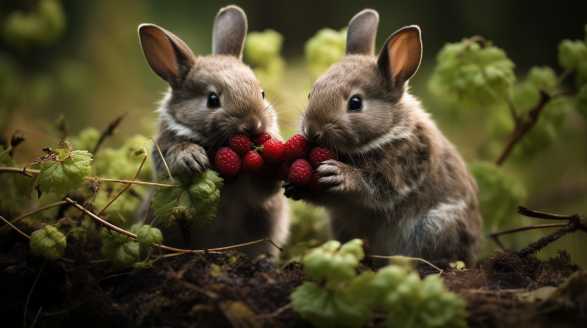
Conclusion
Wow, didn’t our blueberry adventure turn out to be just as exciting as I’d hoped? Who would have thought that these tiny little berries could have such a profound impact on our beloved rabbit’s health and happiness?
Throughout this journey, we’ve learned the dos and don’ts of feeding blueberries to our furry friends. We now understand that moderation is key, and that introducing blueberries gradually, in small portions, is the way to go.
And let’s not forget the importance of monitoring for any allergies or digestive issues, to ensure that blueberries are the perfect fit for our rabbits.
But it’s not just about the how, it’s about the why. We’ve explored the amazing nutritional benefits of blueberries – from their abundance of vitamins, antioxidants, and fiber to their role in boosting the immune system, aiding digestion, and promoting overall well-being.
So, my fellow rabbit enthusiasts, armed with this newfound knowledge, let’s embark on a delicious blueberry-filled journey with our furry friends. Let’s spoil them with these irresistible treats, knowing that we are providing them with a snack that not only tantalizes their taste buds but also supports their health in the most delightful way.
Whether it’s through homemade blueberry treats, mixing blueberries into their salads or pellets, or even creating fun and engaging activities with sliced blueberries, we have endless possibilities to bring joy and nutrition to our rabbit’s lives.
So, my dear friends, let’s embrace the blueberry revolution and watch our rabbits hop with joy and gratitude. Here’s to a future filled with healthy teeth, vibrant fur, improved skin, and overall well-being for our beloved furry companions.
Frequently Asked Questions
Can rabbits eat blueberries?
Yes, rabbits can eat blueberries in moderate amounts. Blueberries are a safe and healthy treat for rabbits and can provide them with additional nutrients.
Are blueberries good for rabbits?
Yes, blueberries are good for rabbits when served in moderation. They contain essential vitamins and antioxidants that can benefit a rabbit’s overall health.
How many blueberries can I feed my rabbit?
It is recommended to feed rabbits no more than one or two blueberries at a time. Although blueberries are generally safe, overfeeding can lead to digestive issues.
Can rabbits eat blueberry leaves and stems?
While blueberry leaves and stems are not toxic to rabbits, they can be difficult to digest and may cause stomach upset. It is best to avoid feeding rabbits blueberry leaves and stems.
Are frozen blueberries safe for rabbits?
Frozen blueberries are safe for rabbits to consume. They can be a refreshing treat during hot weather or as a way to relieve teething discomfort in young rabbits.
Should I wash blueberries before feeding them to my rabbit?
Yes, it is important to wash blueberries thoroughly before feeding them to your rabbit. This helps remove any potential pesticides or residue that could be present on the berries.
Can rabbits eat blueberry seeds?
Yes, rabbits can eat blueberry seeds without any issues. The seeds are small and pose no harm to rabbits when consumed along with the fruit.
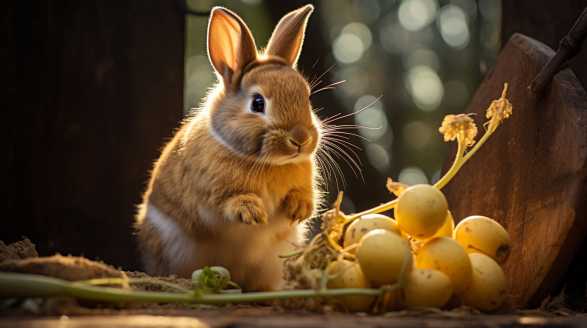
Can Rabbits Eat Potatoes
Introduction Hey there, fellow rabbit lovers! Are you ready to dive down the rabbit hole and uncover the truth about feeding potatoes to our fluffy friends? Can Rabbits eat potatoes? Let’s find out.. As a rabbit owner myself, I’ve always been curious about the nutritional value of potatoes for rabbits. Are they a nutritious treat […]
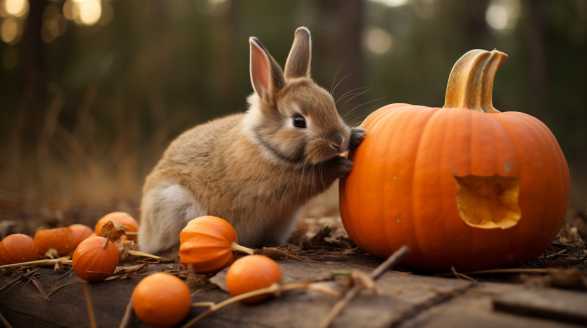
Can Rabbits Eat Pumpkin
Introduction Hey there, fellow rabbit lovers! I’ve got some exciting news to share with you about a topic that has completely blown my mind – pumpkin allergies in rabbits. Let’s find out, can rabbits eat pumpkin? I was just as shocked as you are right now! I mean, who would have thought that our fluffy […]
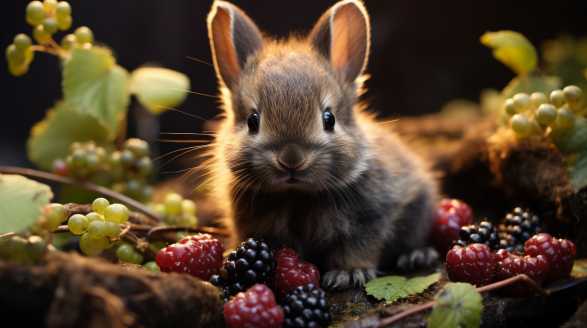
What Berries Can Rabbits Eat
Introduction Hey there, fellow bunny lovers! Are you ready to embark on a berry-tastic journey with me? What Berries can Rabbits eat? Let’s find out Not all berries are created equal when it comes to our precious bunnies. That’s why I’m here to guide you on this wild and berry-filled adventure, ensuring that you provide […]
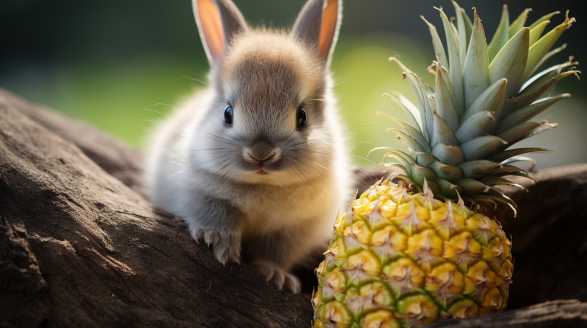
Can Rabbits Eat Pineapples
Introduction Hey there, fellow rabbit lovers! Are you ready to hop into a world of pineapple paradise for your fluffy companions? Let’s find out, can rabbits eat pineapple? I couldn’t be more thrilled to share with you all the juicy details and mouth-watering facts about pineapple and its potential impact on our beloved rabbits’ diets. […]
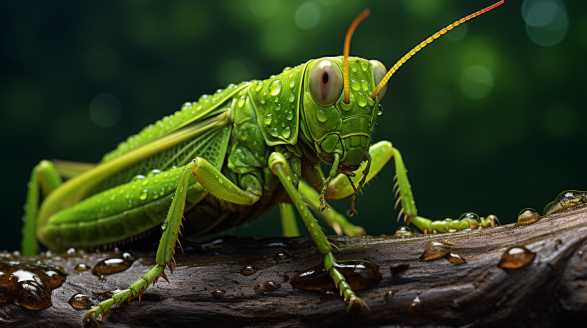
Do Rabbits Eat Grasshoppers
Introduction Do Rabbits eat grasshoppers? Find out in this comprehensive guide. As a nature enthusiast and devoted observer, I’ve spent countless hours studying the incredible relationship between rabbits and grasshoppers. My passion for these captivating creatures has led me on an adventure filled with surprising discoveries, irresistible delicacies, and even a few hidden dangers. In […]
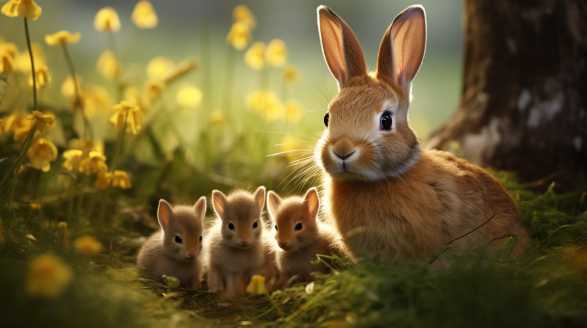
When To Wean Rabbits
Introduction Are you ready to embark on the journey of transitioning your baby to solid food? Well, you’re in the right place! I understand that this can be a confusing and slightly overwhelming phase, but fear not! I’m here to guide you every step of the way. As a parent, one of the most thrilling […]

